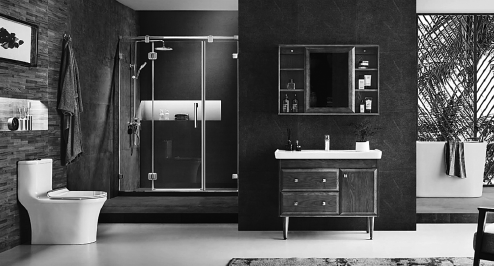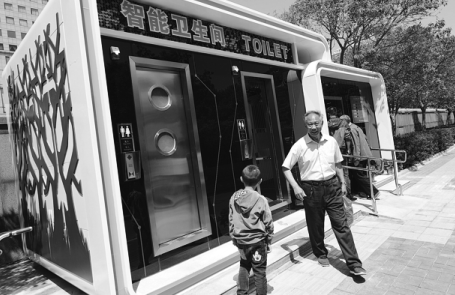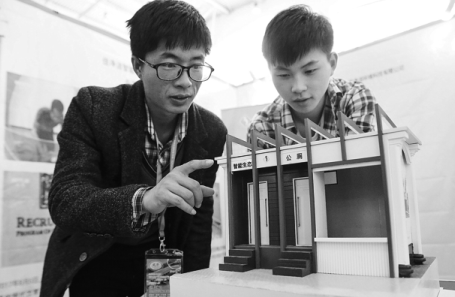Flushed with success
Toilet revolution sees greater focus on users' comfort and convenience, Yang Feiyue reports.

There are different ways to measure economic development. Wage growth, infrastructure development and housing, all have their place in charting progress. But one particular convenience is often overlooked. The humble toilet.
Song Jieping from Jiangxi province just bought a smart toilet in place of the old one that had been used by her family for 11 years.
"It feels good to sit down on a warm toilet seat, especially on a cold winter day," the 35-year-old says. "And the water rinse seems cleaner and healthier."
This is not a cheap thrill. At over 3,000 yuan ($421), it is much more expensive than the non-intelligent toilet but Song considers it is worth it for health reasons as well as the comfort.
Smart bathroom product sales doubled last year, over 2018, according to a report on the ceramic sanitaryware market in 2019, which was compiled under guidance from the China Building Materials Circulation Association and the China Building Material Market Association.
Those born since 1990 are becoming major consumers and looking for sanitaryware with diverse purposes. Some want a more relaxing experience, such as massage and spa features, while some are looking for ease, the report says.
To attract more of this major group of consumers, sanitaryware producers are being innovative, including Huida's general manager Wang Yanqing, who, due to the COVID-19 outbreak, has been livestreaming to promote the company's products.
Wang has staged several online events since March, focusing on toilets, showers and bathroom furniture. One livestreamed event in late March attracted more than 1.4 million viewers who made over 35,000 orders.
Smart items, such as intelligent toilets and thermostatic showers, are among consumer favorites, he says.
"People are paying an increasing amount of attention to their own health and that of their families since the pandemic," Wang says.
"Health-related products, such as smart houses, intelligent toilets and prefabricated bathroom pods will embrace new development opportunities."
Some of the sanitary products have become more popular during the crisis. New features include ultraviolet sterilization, sensor-based lids and hands-free washing, all helping to avoid possible infection, Wang explains. His company was among the first to donate such items, plus other sanitary products, to Huoshenshan Hospital in Wuhan and 46 other hospitals nationwide.
Striding progress
Smart bathroom sales have shown explosive growth in March, according to data from major online shopping platforms, such as JD and Tmall. Intelligent toilet seat sales witnessed a nearly sixfold increase.
The pandemic will bring about profound changes in Chinese society, says Lin Xiaofa, chair of major domestic sanitaryware maker Jomoo, which is headquartered in Fujian province.
Jomoo's new intelligent toilet drew in more than 6 million viewers during a livestreaming event on March 9.
Last year, the company's intelligent toilet-seat sales rose by 60 percent over 2018.
Arrow, another major domestic sanitary brand, based in Guangdong province, has integrated music into its products, to cater to the increasingly diversified needs of the younger generation.
The idea is to offer the most comfortable and relaxing experience for users, says Zhou Zhiwei, a senior officer with Arrow.
Seeing today's advanced sanitary equipment, it's hard for young customers to imagine how crude products were back in the late 1980s.
The factory was "very labor-intensive", as Wang recalls, and the market was very underdeveloped. "We could only make plain ceramic toilets and wash basins with a rough design then," Wang says.
Since 2000, domestic demand has also been on the rise, as "people's lives have improved", Wang says, pushing major domestic brands to upgrade and offer better solutions for the increasing public need.
Major domestic brands, including Huida, Arrow, Jomoo and Hegii, have broadened their product ranges to cover other products for bathroom decoration, and now they are "on a par with international brands, in terms of technology", Wang says.
Last year, sales of major domestic sanitaryware producers stood at about 35 billion yuan, accounting for about 15 percent of the domestic market share, according to the report on the ceramic sanitaryware market.
There's much room for growth, it says.
Actions for a change
In April 2015, President Xi Jinping called for the public's attention to a "toilet revolution" for China's tourism industry.
Between 2015 and 2017, 1.64 billion yuan had been invested to install or renovate over 70,000 toilets at tourist sites, according to the Ministry of Culture and Tourism.
The national toilet revolution campaign was then expanded to encompass urban public toilets and rural private toilets.
In late 2017, the ministry launched a three-year action plan to build and renovate 64,000 Chinese toilets by 2020.
All this has offered momentum for domestic sanitaryware makers. Among them, Arrow built "family toilets"-equipped with safety equipment for kids and the elderly-at major Chinese scenic spots in the past few years. And Huida jumped on the bandwagon by initiating a plan to build and upgrade rural toilets in 1,000 counties and 10,000 towns nationwide.
Wang says there's big potential in rural sales. "The nationwide mass infrastructure development, especially in the western part of the country, and surging demand for prefabricated bathroom pods also mean more opportunities for sanitaryware."
Prefabricated bathroom pods for new buildings are in higher demand, too, due to its environment-friendly and simple installation features-two workers can assemble a whole bathroom in four hours.
According to the report, the market for such bathroom pods reached 7.27 billion yuan last year, and 15 percent of the new buildings nationwide will be fitted with them this year.
The market value of the pods will surpass 10 billion yuan this year and hit 17.3 billion yuan in 2021.
China's public health industry will double from the present 8 trillion yuan by the end of 2030, says finance writer Wu Xiaobo.



Today's Top News
- Disrupting market under fabricated veneer of 'national security' hurts US' own interest: China Daily editorial
- Yasukuni visit would add insult to injury: China Daily editorial
- Judicial reform critical for modernizing governance
- Effective use of investment emphasized
- China's shuttle diplomacy strives to reach ceasefire
- Nanjing Museum's handling of donated art, relics being probed






























